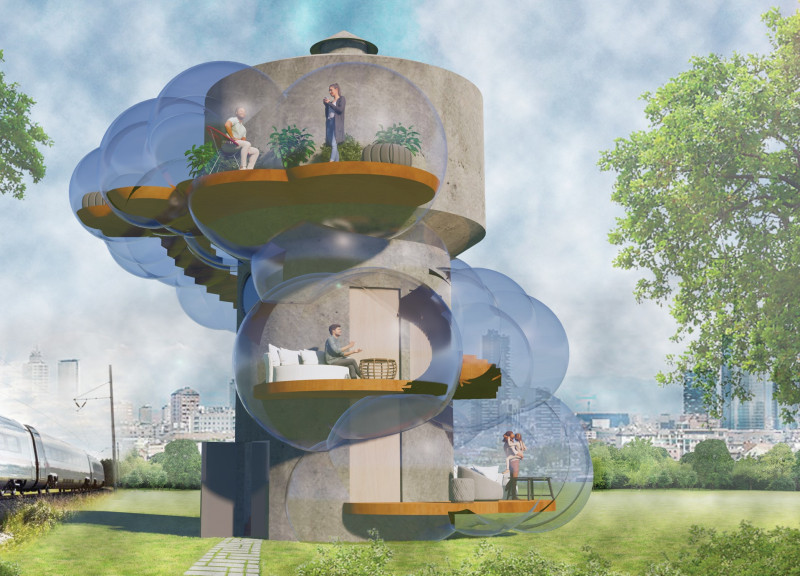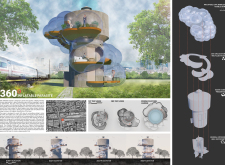5 key facts about this project
At its core, the 360° Inflatable Parasite is an adaptive space that responds to the needs of contemporary urban inhabitants. The design embodies a philosophy that prioritizes adaptability, sustainability, and community interaction. By utilizing inflatable structures, the project allows for a reinterpretation of traditional living spaces, fostering an environment that can easily adjust to the shifting demands of its residents and the urban context.
Significantly, the structure consists of a central cylindrical core, which serves as the backbone of the design, anchoring the assorted inflatable pods that extend from it. Each pod can function independently, enabling a variety of uses such as sleeping, working, or leisure activities. This modular approach allows for the personalization of living spaces, providing residents the ability to customize their environment according to their individual needs. The transparent nature of the inflatable ETFE bubbles contributes an ethereal quality to the design, ensuring abundant natural light while promoting a seamless connection between indoor and outdoor environments.
The incorporation of recycled wood in the construction of the central core and flooring reflects a commitment to sustainability. This choice not only emphasizes environmental consciousness but also adds warmth and texture to the internal spaces, striking a balance between modernity and nature. Moreover, the water tank integrated into the design embodies principles of self-sufficiency, crucial for urban living where access to resources may be limited.
The 360° Inflatable Parasite’s unique approach to design extends beyond materials and structural organization; it also emphasizes community. Shared green spaces and communal areas are integral to the project, encouraging interactions among residents and fostering a sense of collective living. Vertical gardens and viewing platforms enhance the aesthetic of the design while reinforcing its ecological footprint.
In addition to its functional attributes, the architectural design serves as a conversation starter about the future of urban housing. The project reflects a thoughtful consideration of how architecture can evolve to meet both environmental and social challenges. Its emphasis on mobility, sustainability, and community engagement positions it as a relevant solution within the modern architectural discourse.
The 360° Inflatable Parasite is an example of how innovative design can cultivate community-centric living spaces that adapt to the complexities of urban life. Those interested in delving deeper into its architectural nuances are encouraged to explore the detailed architectural plans and sections, as well as the underlying architectural ideas that shape this project. Engaging with these materials will provide a comprehensive understanding of the nuanced design choices that define this innovative architectural endeavor.























